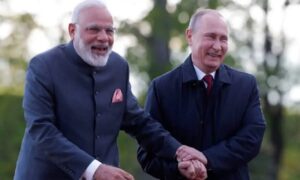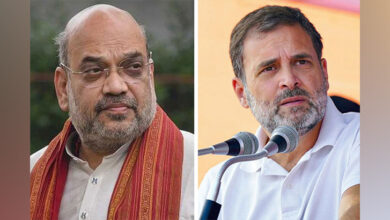Modi’s visit to Russia: How much impact will it have on the Western world?
Hungarian Prime Minister Viktor Orbán met Russian President Vladimir Putin on Friday. European leaders reacted strongly to this meeting held in Moscow, the capital of Russia. European countries are seriously considering providing military and other aid to Ukraine. A visit to Russia by any European leader at that time could be seen as ‘treason’.
Incidentally, Hungary is seen as a separate country in Europe. The Prime Minister of that country, Orban, is considered by many to be a dictator. Meanwhile, Indian Prime Minister Narendra Modi has also visited Russia. Now the question is how will the leaders of Western countries look at this visit of Prime Minister Modi on July 8 and 9 in this atmosphere?
Attitudes of Western countries on the visit to Russia
So far, the leaders of the western countries have not directly commented on Narendra Modi’s Russia trip in that sense. However, the US Ambassador to India, Eric Garcetti, said on Thursday that his country is in constant contact with India to jointly hold Russia accountable for the attack on Ukraine. It is now clear that neither the UK nor the US will be happy to see Narendra Modi and Vladimir Putin together. Because both countries think that the reason for the instability in Europe is the Russian attack on Ukraine. And President Putin is to blame.
Officially speaking, the Prime Minister of India has visited Russia to attend the 22nd India-Russia Annual Summit at the invitation of Vladimir Putin. There has been no bilateral meeting at the highest level between these two countries in the last three years.
Possible agenda
Regarding the issues that may be discussed between the two heads of state, Russia said that Vladimir Putin and Narendra Modi will discuss all the relevant international and regional issues besides strengthening the traditional friendly relations between India and Russia. Meanwhile, Narendra Modi’s visit to Russia has caused discomfort to several Western countries. Those countries are skeptical about the meaning of this bilateral meeting.
Professor Christophe Jaffrelot of ‘South Asian Studies’ at King’s College London said that India’s Prime Minister Modi’s visit to Russia has geopolitical significance.
According to him, India is very interested in developing its relations with Russia. And that is not only because of their (India’s) dependence on Russia for military equipment, but India wants to project a multi-polar world where they (India) are in a position to promote their own interests with all partners.
Modi’s visit to Russia
Professor Jaffrelot believes the visit also has something to do with China’s growing closeness with Russia. He is of the opinion that China’s cordial relations with that country (Russia) can be ‘diminished’ by creating a special relationship between India and Russia.
In 2019, Narendra Modi visited the Russian city of Vladivostok to attend an economic conference. Vladimir Putin last visited Delhi in 2021. The 21st India-Russia Annual Summit was held in India that year. President Putin and Prime Minister Modi last met in Uzbekistan during the ‘Shanghai Cooperation Organization’ or SCO summit in 2022.
Incidentally, Narendra Modi did not attend the 24th SCO Summit held a few days ago (July 3rd and 4th), though the Russian President attended.
India, Russia, China, Iran and some Central Asian countries are members of SCO. The heads of state of all these countries attended the meeting, but Indian Prime Minister Narendra Modi himself did not attend. Instead, India was represented by External Affairs Minister S Jaishankar. India’s former foreign secretary, Kanwal Sibal, said that although he did not meet Vladimir Putin in that meeting, he would be “compensated” with a pre-scheduled visit to Russia.
He wrote on social media that Prime Minister Modi will not be able to attend the SCO conference as Parliament is in session. It will be compensated by visiting Russia in July. PM Modi’s absence from the SCO summit has also been questioned.
Meanwhile, Narendra Modi’s visit to Russia comes at a time when the US and its European allies are trying to isolate Russia globally. Strict sanctions have also been imposed on Russia.
India claims that its foreign policy is based on ‘strategic autonomy’ and ‘national interest’. But considering the anti-Russian sentiment spreading in Western countries, could the visit anger India’s strategic partner America?
The United States may be angry
Steve H Hanke, professor of applied economics at Johns Hopkins University in Baltimore, USA, believes that India has a historical relationship with Russia. Professor Hanke served on President Reagan’s Council of Economic Advisers.
He said it is clear from the statements of Prime Minister Modi and External Affairs Minister S Jaishankar that India wants good relations with all countries, especially Russia. Because it is a country with which India has good relations since the Soviet era.
India-Russia friendship
It was almost impossible for anyone growing up in India from the 1960s to the 1980s to escape Soviet influence. Russia has established many big steel factories in India. Not only that, Russia has also helped India’s space program. They have stood by India even in difficult situations. The historic Tashkent Agreement was signed between India and Pakistan in 1965, mediated by Russia. No Indian can avoid talking about the late film actor Raj Kapoor when he visited Russia.
When Vladimir Putin was first elected president in 2000, the two countries signed defense, space and economic agreements under the Declaration of Strategic Partnership. The S-400 missile defense system agreement and the agreement on energy cooperation have also been significant in recent efforts to push bilateral relations further.
India and Russia have the potential to strengthen bilateral relations while addressing various complications. Based on which it can be ensured that this relationship remains strong despite the changing global situation.
Right-wing theorist Dr. Shubhrakmal Dutt feels that India-Russia relations are now ‘at the peak’. According to him, the Indian Prime Minister’s visit will usher in a new, changing geopolitical world order. As a result many new additions will emerge.
India’s ‘neutrality’ cause of disappointment for the West?
As a strong democracy, India has repeatedly lamented India’s failure to condemn Russia’s invasion of Ukraine. But India’s ‘neutrality’ is often perceived as pro-Russian. Many in India believe that the Western media has lost its ‘neutrality’ when it comes to Russia.
Dr. Dutt said, they (India) will condemn Russia in the war against Ukraine, this expectation of Western countries will not be fulfilled in any case. Because the most important thing for India is their national interest. Despite this, the West is ‘concerned’ about the strong India-Russia relationship and (India’s) ‘reluctance’ to condemn Russia for its invasion of Ukraine!
Meanwhile, the US and EU members see India’s stance as complicating their efforts to isolate Russia diplomatically and economically.
Are sanctions on Russia working?
So are the Western sanctions imposed on Russia to stop funding Russia to continue its war against Ukraine not working? Indian Foreign Minister S Jaishankar gave a strong reply to reporters’ questions about this in Washington two years ago. He said that despite the sanctions, Western countries were importing much more crude oil from Russia than India.
He said at the time, “If you’re talking about buying fuel from Russia, I’d suggest you look to Europe.” We buy small amounts of energy that are necessary for our energy security. India buys as much oil from Russia in a month as Europe buys in one night.
Professor Hanke is one of the experts who believes that sanctions against Russia are not working. A growing number of experts in the United States agree with him.
“I am opposed to restrictions and interference with free trade, both in principle and in practice,” he said. These restrictions almost never work as expected. India’s view on the oil embargo is the same as mine. Although Professor Dr. Jaffrelot contradicts Professor Hank’s view. He said, I do not agree with this. Many in the West say otherwise.
Sanctions are not effective because they do not get a chance to work fully. Especially because of India and EU countries that help sell oil to Russia. However, it remains to be seen whether such a rule creates controversy or not.





